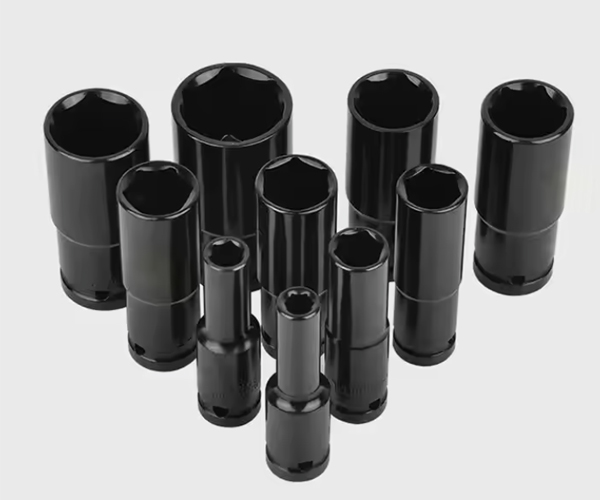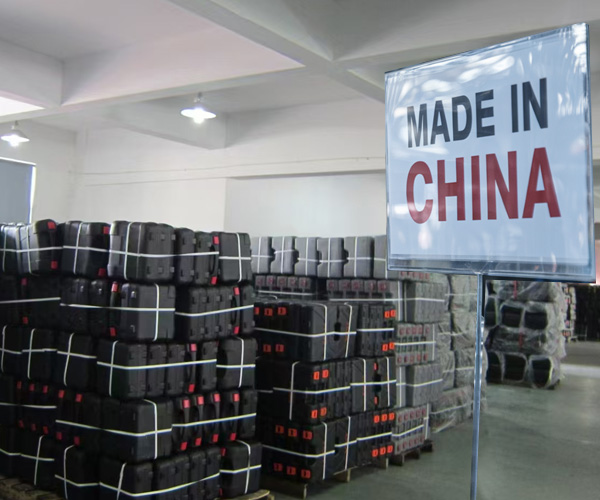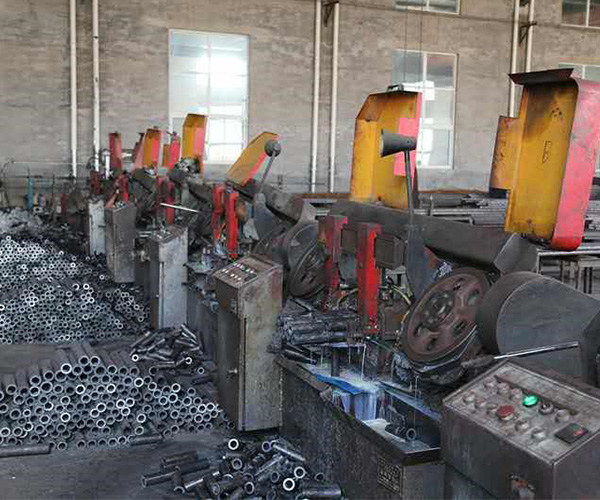1. Introduction
Impact sockets are essential tools in automotive, mechanical, and industrial settings, designed to withstand high torque and heavy-duty usage. Built specifically for power tools, these sockets play a vital role in tasks that demand both precision and strength, such as vehicle maintenance and machinery repair. Unlike regular sockets, impact sockets are crafted from more resilient materials like chrome-molybdenum or hardened steel, making them durable enough for high-impact work without cracking or breaking.
When businesses or repair shops need to buy impact sockets, sourcing from reliable suppliers becomes a priority. One of the most efficient and cost-effective ways to do so is by purchasing in bulk. Not only does buying impact sockets in large quantities save on per-unit costs, but it also allows companies to maintain a consistent inventory, reducing the risks of stock shortages. For industries relying on quick service turnarounds, having a well-stocked supply of high-quality impact sockets can be the difference between seamless operations and frustrating delays.
This article is designed as a comprehensive guide for anyone looking to find dependable, bulk suppliers of impact socket sets, with a focus on navigating the options available for sourcing from China, a leading global supplier. Whether you’re a distributor, a tool procurement manager, or an automotive business owner, this guide will equip you with the insights needed to make informed purchasing decisions for impact sockets in bulk.
2. Understanding Bulk Impact Socket Requirements
When purchasing impact sockets, especially in bulk, it’s essential to understand the various specifications and qualities that can affect their performance and durability. Here, we will explore the types of impact sockets, their specifications, and the importance of quality standards. This knowledge not only aids in selecting the right supplier but also ensures that the tools meet the requirements of your business.
Different Types of Impact Sockets
Impact sockets are manufactured in a range of styles and designs to suit various applications. Here’s a breakdown of some common types to consider:
- Metric vs. Imperial: Metric sockets are measured in millimeters, while imperial sockets use inches. The choice depends on the regions or industries where the tools are used. For example, metric sockets are commonly preferred in Europe and Asia, whereas imperial sockets are more standard in North America.
- Deep vs. Shallow Sockets: Deep sockets are longer, allowing them to reach fasteners in deeper recesses, while shallow sockets are shorter and are ideal for tight spaces. Deep impact sockets are especially useful in automotive applications where bolts are often deeply seated.
- 6-Point vs. 12-Point Sockets: The 6-point socket provides a stronger grip and is less likely to slip, making it more suitable for high-torque applications. On the other hand, 12-point sockets offer flexibility and ease of use but may not be as durable under extreme stress.
Key Specifications to Consider
When selecting impact sockets, there are a few technical aspects to keep in mind:
- Material Composition: High-quality impact sockets are often made from chrome-molybdenum (Cr-Mo) or hardened steel, known for their strength and ability to withstand heavy use. Cr-Mo, in particular, has a balance of flexibility and strength, reducing the risk of cracks under high torque.
- Torque Rating: The torque rating is crucial for high-impact applications, as it determines the amount of force the socket can handle. Always match the socket’s torque rating to the requirements of the job or the power tool’s specifications to ensure safety and efficiency.
- Coating and Corrosion Resistance: A protective coating, such as black phosphate or chrome plating, helps protect the socket from corrosion. This is especially valuable for impact sockets stored or used in humid or outdoor environments.
Certifications and Quality Standards
In industrial tools, certifications play a vital role in ensuring product reliability and performance. The most reputable suppliers often have their products certified by organizations like ISO (International Organization for Standardization) or ANSI (American National Standards Institute). These certifications guarantee that the tools meet industry standards for safety, quality, and durability.
For businesses purchasing impact sockets in bulk, verifying that suppliers meet these quality standards is essential. This ensures that your tools will not only perform well but also last, minimizing replacement costs and enhancing operational efficiency over time.
3. Why Quality Matters in Impact Sockets
When sourcing impact sockets, particularly for heavy-duty or industrial applications, quality should be a top priority. Investing in high-quality impact sockets can prevent many issues down the line, such as tool breakage, operational delays, or even safety risks for workers. This section will delve into the importance of quality and how to evaluate it in potential suppliers.
The Risks of Low-Quality Sockets in Heavy-Duty Applications
Low-quality impact sockets may be tempting due to their lower prices, but they pose significant risks:
- Safety Hazards: Low-grade materials are prone to cracking or shattering under high torque, which can lead to serious workplace injuries. Given that impact sockets are often used with powerful, fast-turning tools, any breakage can send fragments flying at dangerous speeds.
- Increased Wear and Tear: Inferior sockets wear down faster, leading to frequent replacements and higher overall costs. While the initial investment may seem economical, regular replacements add up quickly.
- Operational Delays: When a socket breaks in the middle of a job, it can halt operations, delaying timelines and causing inefficiencies. For companies working with tight schedules, these delays can affect customer satisfaction and profit margins.

How to Evaluate Supplier Quality
Choosing a high-quality impact socket supplier requires careful evaluation. Here are some key methods to ensure you’re getting durable products:
- Product Testing and Certifications: Always check if the supplier has industry-standard certifications, such as ISO or ANSI, which verify the quality and safety of their products. Reliable suppliers are transparent about their quality control processes and often provide product test results upon request.
- Supplier Reputation and History: Look for suppliers with a solid history of manufacturing high-quality tools. Reading customer reviews and testimonials can provide insight into the supplier’s reliability. It’s beneficial to work with established suppliers who have a track record in the industry.
- Sampling Before Bulk Orders: Many suppliers offer samples or small trial orders. Testing a sample in real working conditions is one of the best ways to assess the socket’s durability and performance before committing to a large purchase.
4. Where to Source Bulk Impact Sockets
Now that you understand the importance of specifications and quality in impact sockets, the next step is to explore sourcing options. Various channels offer bulk purchases, each with unique advantages and considerations.
1. Industrial Manufacturing Hubs (China, Vietnam, India)
China is a global leader in manufacturing, especially in automotive and industrial tools, making it an ideal location to source impact sockets. Suppliers in China offer a wide range of options, competitive pricing, and often provide OEM (Original Equipment Manufacturer) services for branding. Similarly, Vietnam and India are emerging markets with growing manufacturing capabilities.
- Pros: Competitive pricing, wide variety of options, customization services available.
- Cons: Possible language barriers, longer shipping times, and quality control issues if not vetted carefully.
2. Online B2B Marketplaces
B2B platforms like Alibaba, Global Sources, and ThomasNet make it easier to find suppliers that offer bulk impact sockets. These marketplaces provide a range of suppliers, along with reviews, certifications, and order details, making it easier to compare options.
- Pros: Convenient, wide supplier selection, with buyer protection available.
- Cons: Limited personal interaction with suppliers, making it challenging to verify quality directly.
3. Trade Shows and Expos
Industry-specific trade shows, such as the Canton Fair in China or the SEMA Show in Las Vegas, are excellent venues for finding reputable impact socket suppliers. Trade shows allow buyers to see products firsthand, evaluate quality, and even negotiate pricing face-to-face.
- Pros: Direct product inspection, opportunity to build relationships with suppliers, real-time negotiation.
- Cons: Higher travel and accommodation costs, time investment required to attend.
4. Local Distributors and Wholesalers
For buyers who prefer to avoid the complexities of international sourcing, local distributors can provide reliable impact socket supplies. Though prices may be higher, local sourcing often comes with faster delivery times, simpler communication, and easier returns or exchanges.
- Pros: Faster delivery, easier quality checks, local support.
- Cons: Higher costs compared to direct international sourcing.
5. Factors to Consider When Choosing a Supplier
Selecting a bulk impact socket supplier involves more than just finding a good price. The right supplier will meet your quality standards, provide flexibility in terms of orders, and offer reliable communication. Below are several critical factors to keep in mind.
Quality and Certifications
Ensure that the supplier meets all relevant quality standards, including those specific to impact tools. This is particularly vital for industries that require high-strength tools, where quality cannot be compromised. Confirm that certifications are genuine and consider third-party verification if necessary.
Pricing and Payment Terms
Pricing is a key consideration, but it should be balanced with quality. Discuss payment terms upfront, especially for bulk orders, as some suppliers may offer discounts or allow installment payments. Comparing price models such as FOB (Free on Board) and CIF (Cost, Insurance, and Freight) can also clarify total costs, including shipping and handling.
Lead Times and Shipping Options
Knowing the supplier’s production lead times is essential, especially for businesses that require a steady flow of products. Suppliers that can offer flexible shipping options, such as express air freight for urgent orders or economical sea freight for larger shipments, are preferable for bulk sourcing.
Customer Service and Communication
Effective communication with your supplier helps ensure smooth transactions and clear expectations. Assess the supplier’s responsiveness and their willingness to assist with issues, such as product customization, order tracking, or handling any misunderstandings.
6. Evaluating Supplier Reliability
Once you’ve shortlisted potential suppliers, evaluating their reliability becomes the next step. Building a long-term relationship with a trustworthy supplier can save significant time, money, and frustration.
Supplier Verification Methods
To verify the reliability of a supplier, consider using third-party inspection services such as SGS or Bureau Veritas. These organizations conduct comprehensive assessments of factories, including safety checks, quality control measures, and production capacity evaluations, ensuring that suppliers meet global standards.
Checking Online Reviews and Feedback
Customer feedback on B2B marketplaces like Alibaba or Global Sources can provide valuable insights into a supplier’s track record. Reviews can reveal common complaints, like delayed shipments or inconsistent product quality, helping you make a more informed choice.

Requesting Samples and Trial Orders
Many suppliers offer samples or trial orders, which allow you to test the products before committing to a full bulk purchase. Sampling provides a chance to assess the quality, durability, and usability of the impact sockets in actual working conditions, minimizing the risks associated with a large order.
7. Logistics and Shipping Considerations
Shipping logistics play a critical role in bulk purchases, affecting both the timeline and cost of procurement. Whether you’re sourcing from overseas or domestically, having a clear understanding of shipping processes is essential.
Shipping Options for Bulk Orders
For bulk orders, sea freight is generally the most cost-effective option, though it comes with longer transit times. Air freight, while more expensive, is faster and suitable for urgent orders or smaller, high-value shipments. Make sure to discuss Incoterms with your supplier to clarify responsibilities for shipping costs, insurance, and potential risks.
Customs and Import Regulations
Different countries have varying regulations for importing tools, including impact sockets. Be sure to research the specific customs requirements of your destination country, including duties, taxes, and documentation. Working with a customs broker can simplify the process, ensuring that your shipment meets all legal standards.
Packaging and Labeling Requirements
Impact sockets are heavy items that require secure packaging to prevent damage during transit. In addition to protective packaging, some regions require specific labeling for imports. Make sure your supplier is aware of these requirements, and confirm they comply with all labeling and packaging standards.
8. Cost-Saving Tips for Bulk Purchases
Buying in bulk already offers significant savings, but there are additional strategies to reduce costs further. Here are some tips to help you maximize your budget:
Negotiation Strategies with Suppliers
For large orders, negotiate discounts or favorable payment terms with suppliers. Many suppliers are willing to offer a better price for ongoing partnerships or high-volume contracts. Be clear about your expectations and consider discussing future repeat orders, as long-term agreements may yield additional savings.
Optimizing Shipping Costs
Shipping expenses can add up quickly, especially for international orders. To minimize these costs, consider consolidating orders to reduce the frequency of shipments. Additionally, choosing the appropriate shipping method—sea for larger orders and air for smaller, high-value items—can provide more efficient logistics.
Tax Incentives and Rebates
Some countries offer tax rebates or incentives for importing certain tools or industrial products. Check with local customs or trade agencies to see if your order qualifies for any such incentives, which could further reduce overall costs.
9. Common Challenges and Solutions When Sourcing in Bulk
Navigating the challenges of bulk sourcing can be daunting, but understanding common obstacles helps prepare you for a smoother experience. Here are a few frequent issues and their solutions:
Dealing with Shipping Delays
Shipping delays are a reality in global trade, often caused by factors like port congestion or supply chain disruptions. To mitigate this risk, maintain flexible timelines, communicate regularly with your supplier, and have a backup supplier or emergency stock to prevent complete shortages.
Quality Control and Inspection
Quality control is essential when sourcing in bulk. Consider hiring a third-party inspector to evaluate the product quality before shipping. Regular inspections reduce the risk of receiving faulty or inconsistent products, ensuring that you get what you paid for.
Handling Unforeseen Costs
Hidden costs, such as customs fees or storage charges, can add up. Work with a freight forwarder or customs broker to help identify these fees in advance, giving you a clearer picture of total expenses and avoiding unexpected financial burdens.
10. Working with a Supplier for Custom Branding
For businesses looking to distinguish their products in the marketplace, custom branding options for impact sockets can add significant value. This section explores ways to personalize bulk orders with your brand identity.
Branding Options for Bulk Orders
Many suppliers offer options for custom logo engraving or specialized packaging. Custom branding enhances the professionalism of your products, making them more attractive to end-users.
Negotiating OEM Services
For businesses looking to create a unique product line, partnering with an OEM allows for customized design and branding. Discuss your specific requirements with the supplier to establish clear agreements for product modifications, ensuring that the final product aligns with your brand.
Legal Aspects of Branding
When branding imported goods, it’s crucial to review intellectual property laws and ensure compliance with trademark regulations. Protecting your brand legally not only enhances its value but also prevents unauthorized copying of your designs.
11. Top Questions to Ask Before Finalizing a Supplier
Finalizing a supplier is a major commitment, and asking the right questions can provide clarity and peace of mind. Here are key questions to consider:
- Questions to Ensure Product Quality: Verify product quality by asking about material sources, testing processes, and warranties.
- Questions on Order Flexibility: Inquire about policies for order modifications, returns, and restocking.
- Long-Term Support and Maintenance: Assess the availability of after-sales support for addressing warranty claims or assistance with defective items.
12. Case Study: Successful Bulk Sourcing of Impact Sockets
Consider the example of a tool distributor who needed a reliable supply of high-quality impact sockets. Through diligent research, careful supplier selection, and regular quality inspections, they secured a reputable supplier. This partnership enabled consistent inventory, high customer satisfaction, and better profit margins by minimizing product defects and reducing replacement costs.
Lessons Learned: Diligence in supplier selection and strong negotiation tactics are critical to successful bulk sourcing.

13. Conclusion
Final Checklist for Choosing an Impact Socket Supplier
Finding the right supplier for bulk impact sockets requires attention to detail, from checking certifications and quality to understanding logistics and costs. By following this guide, you’ll be well-prepared to make informed decisions that support your business goals.
Ready to Source High-Quality Impact Sockets in Bulk?
Finding a dependable supplier for impact sockets can transform your business efficiency and profitability. At KOLARWIN, we specialize in delivering high-quality mechanic tools, including impact socket sets, tailored for wholesale and bulk buyers. With a focus on quality, certifications, and reliable logistics, we’re here to help you scale up with confidence.
Why Partner with KOLARWIN?
- Quality Assurance: Our tools meet industry standards, ensuring durability and performance.
- Competitive Pricing: Enjoy wholesale rates and customized pricing for bulk orders.
- Flexible OEM Options: Elevate your brand with custom branding and packaging options.
- Reliable Customer Support: Dedicated support for seamless transactions from order to delivery.
Contact Us Today
Let us help you streamline your supply chain with impact sockets built to perform. Reach out to us for inquiries, samples, or to discuss your bulk order needs. Partner with KOLARWIN for tools you can trust, delivered on time, every time!





